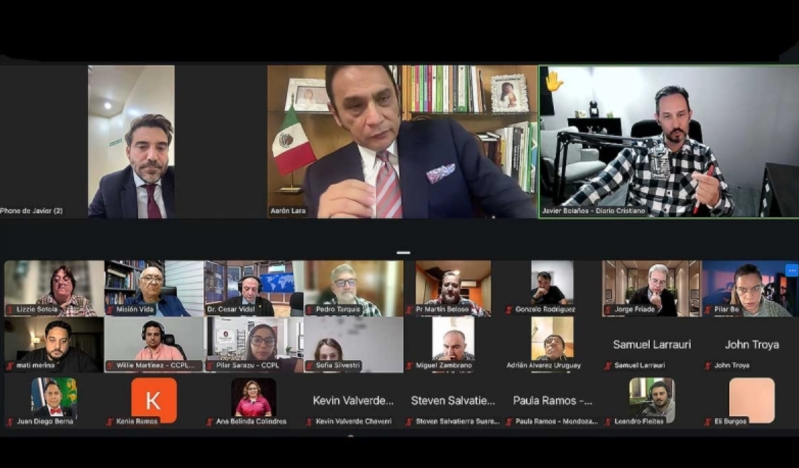
On May 21, about 30 journalists from across Latin America, North America, and Europe gathered for a virtual meeting convened by the Ibero-American Congress for Life and Family. The meeting aimed to introduce a new initiative: the Alliance of Christian Communicators (ADECOM), a platform envisioned to strengthen collaboration among evangelical journalists and media professionals across the region.
Hosted by Aarón Lara, president of the Ibero-American Congress, the session opened with brief remarks from Pedro Tarquis, director of Areópago Protestante in Spain, and César Vidal, a prominent journalist, author, and broadcaster. Participants included representatives from various countries and Christian outlets, such as editor Javier Bolaños and Latin America correspondent Lizzie Sotola from Diario Cristiano, Christian Daily International's Spanish edition.
In his opening address, Lara offered an overview of the Congress’s mission and origins, highlighting its role in defending life and family values across international platforms such as the Organization of American States (OAS). He emphasized the importance of equipping Christian communicators for greater influence and engagement in the public sphere.
“Significant challenges are unfolding at the General Assemblies of the OAS,” Lara said. “This is the moment to come together—not only in prayer and advocacy—but also by organizing media professionals who can represent and communicate biblical values with clarity and integrity.”
Tarquis then explained that the new alliance seeks to be “a bridge among evangelicals themselves, and also a bridge to society—to engage with it and, at the same time, influence it.” He stressed the need for Christian communicators to be seen as credible professionals who can interact meaningfully with the secular world.
“They should not see us as spokespersons for institutions,” he said, referencing concerns that some Christian media are perceived primarily as extensions of political or denominational interests. “We can be powerful voices—not official media—but strong, independent professionals committed to the truth.”
Tarquis challenged participants to “serve as loudspeakers, like strong professional media outlets,” adding that Christian journalists should offer compelling content that earns respect in the broader marketplace of ideas. “Without being official channels, we have the advantage of speaking freely and directly to society.”
He also clarified that ADECOM would be “an autonomous project” but one connected to the Ibero-American Congress, similar to its other specialized branches, including its political initiatives, OAS engagement, parliamentary forums, and training school. The new alliance, he said, would operate with the capacity for self-management while maintaining coordination with the Congress’s Board of Directors and its various national networks.
César Vidal expanded on the alliance’s philosophy, stressing that ADECOM is not meant to replace or compete with existing Christian media networks. “This is not a one-size-fits-all experience,” he said. “There are many members in the Body of Christ. What may work for one part may not work for another.”
He drew from 20 years of media experience to underscore the value of mutual support. “I want to encourage us to help one another, to pray for one another, to collaborate without rivalry,” he said. “There is no room for jealousy when the calling is to speak truth and shine light.”
Vidal also shared a personal testimony illustrating why he believes communication ministries matter now more than ever. He recounted a life-threatening attack on his former residence in Spain, which occurred shortly after he had moved to the United States. “Had I been there, I wouldn’t be alive today,” he said. “God spared my life, and I believe it was for a purpose—to continue proclaiming the truth through media.”
His reflections emphasized both the urgency and the cost of Christian witness in media. “We are living in an absolutely crucial time,” Vidal said. “This is not merely about information; it is about transformation.”
During the closing moments of the meeting, participants raised questions about the rationale for forming a new alliance when others already exist. Several international and regional networks already support evangelical media professionals. Yet organizers suggested that existing structures often have limited engagement with intergovernmental platforms like the OAS, where policy decisions directly impacting families, religious freedom, and life issues are being made.
Pastor Jorge Márquez highlighted a strategic gap: “Journalists can reach places where other advocacy groups often can’t. That’s why it’s important to organize this kind of alliance—one that can operate both within media circles and international institutions.”
While the full scope and structure of ADECOM have yet to be unveiled, the initiative is clearly envisioned as a long-term effort to equip and mobilize Christian communicators across the Spanish- and Portuguese-speaking world. Organizers said further details would be released in June.
Until then, ADECOM remains in a consultative phase, gauging interest and identifying collaborative partners who share its dual goal of building bridges within the evangelical community and offering a credible Christian witness in the wider public square.
Originally published at Diario Cristiano, Christian Daily International's Spanish edition.





